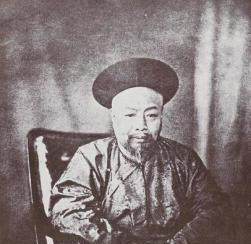Hello netizens, thank you very much for opening the article of the editor, I will, as always, share some knowledge and views with you openly, if the next content can produce some small happiness for you, the author will be honored!

In the struggle against foreign invaders in the late Qing Dynasty, there was a Qing official who was known as the "Viceroy of the Six Noes", that is, "no war, no peace, no defense, no death, no surrender, no walking." The measure of the subject, the ambition of the subject, the ancient place, is rare today. "This person is Ye Mingchen, who served as the governor of Liangguang and was promoted to the post of Viceroy of Liangguang.
Ye Mingchen, zi Kunchen, Hubei Hanyang people, born in 1807. Daoguang fifteen years into the soldier, the selection of Shu Jitu, teaching editing. In eighteen years, he became the prefect of Xing'an, Shaanxi. He successively served as an envoy to Yanping Province, Jiangxi Yandao, and Yunnan, and a political envoy to Hunan, Gansu, and Guangdong. Twenty-eight years, promoted to Inspector of Guangdong. It can be said that before Ye Mingchen came to Guangdong, his career had been smooth sailing, but after coming to Guangzhou, everything changed.
In 1849, the British asked to be stationed in the city of Guangzhou, when "Ye Mingchen and the governor Xu Guangjin insisted on not allowing it, united the vigilante group, and kept it on guard." Because of Ye Mingchen's merits in preventing the British from entering the city of Guangzhou, he was made a baron of the first class. In the first year of Xianfeng (1851), he suppressed the Tiandihui rebellion in Luojing, Nanshao and other places, and rewarded him with the title of Prince Shaobao, and was promoted to the governor of Liangguang the following year. Xianfeng received arms from British and American invaders in four years to suppress the Guangdong Tiandihui uprising, and Xianfeng was promoted to a fellow of Renge University in seven years.
However, Ye Mingchen's career came to an abrupt end at this moment, and on September 10, 196, Xianfeng, the "Yaluo Incident" broke out, resulting in Ye Mingchen's mishandling, which to some extent led to the outbreak of the Second Opium War. In October of that year, the British army captured the city of Guangzhou, but due to the small number of troops, it soon withdrew from the city. In September of the following year, the Anglo-French coalition army came again to attack Guangzhou, and in October it captured Guangzhou, when the Anglo-French coalition army demanded that Ye Mingchen surrender within 48 hours, but Ye Mingchen did not react, neither resisting nor negotiating peace, nor escaping.
In November of that year, Ye Mingchen was captured by the British and French forces and immediately escorted to the warship "Dreadnought" moored in Hong Kong. Because Ye Mingchen was a heavy minister of the Qing Dynasty at that time, the British army did not mistreat him, but "all the officers on the warship respected him very much." Occasionally, when some people got on the ship, they all greeted Ye with their hats, and he also owed him a gift to take off his hat. After 48 days on a warship, he was sent to Calcutta, India. ”
After Ye Mingchen was captured, he thought that the British army had escorted him to Britain, so he prepared to argue with the Queen of England face to face, "The reason why I did not die was that the Wenyi people wanted to send me to Britain. Hearing that his king is known as clear and reasonable, intending to see the king, and theorizing in person, having been reconciled, why did he provoke for no reason? What is right and wrong? ”
After Ye Mingchen came to Calcutta, India, the British forced Ye Mingchen to wear a court dress, wear boots on his feet, wear a three-eyed red hat, and sit in a glass room to sell tickets, which was a great shame. When Ye Mingchen found that seeing the Queen of England was hopeless, he decided to go on a hunger strike. Ye Mingchen fell ill on February 29 and died of illness at the beginning of March.